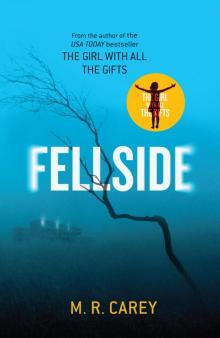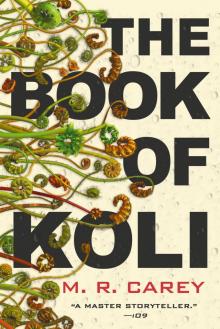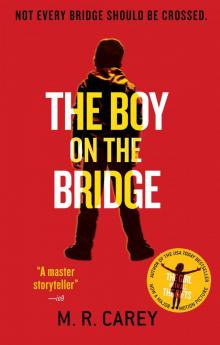- Home
- M. R. Carey
Someone Like Me Page 4
Someone Like Me Read online
Page 4
“You’re doing okay,” one of the doctors reassured Liz after she asked this question for the third time—as if all she wanted was reassurance as opposed to, say, actual information. “Most of the damage to your throat is just swelling and bruising. Your hyoid, which is a little bone that sits right here under your chin, isn’t broken, and there’s no vertebral fracturing.”
“Lucky me,” Liz said. Her voice came out as a croak. Her throat had started to ache badly in the car and it hurt to talk. The doctor was younger than she was, and she didn’t want to give him a hard time. She did want an answer, though, so she gave it another try. “Look, what’s this TBI? Please. Inquiring minds want to know.” She smiled to take the edge off the insistence.
“It’s a complication we see sometimes in cases like this,” the doctor said. “Brain-related. It’s not common, though. It would depend on how long your husband was actually applying pressure to your throat.”
“Ex-husband.”
“Ex-husband, sorry. Anyway, with strangulation there are a whole lot of collateral conditions we have to test for. I mean, even if we’re pretty certain that everything’s okay. There was a case last year where a man was discharged from hospital after a manual strangulation attack and he died a week later. That was because he got a heart attack, but the brain damage from the throttling brought it on.” The doctor seemed to regret sharing this little anecdote as soon as it was out of his mouth. “Not that that’s going to happen to you,” he added hastily. “The odds are way, way long.”
Never play the odds, a friend had told Liz once. Go into everything expecting the worst. Owning it like you already bought it. That way you had no beef and no regrets.
“So I’m guessing the B in TBI stands for brain.”
“Yes, it does,” the doctor admitted.
“And the T? Terrible? Traumatic? Tangerine-flavored? Just give me a clue.”
“Traumatic, yes. Traumatic brain injury. But again, Ms. Kendall, you’re not at risk. That guy I mentioned was in his sixties. You’re clear on the MRI scan. Nothing weird in your tissue densities, no edematous masses. So unless you’ve got any reason to think you might have a brain injury …”
Liz hesitated. She didn’t want to say it. She could imagine how it would sound if a lawyer stood up in court and read it aloud. But maybe what she had experienced was an obvious symptom of a known condition. Maybe if she didn’t speak up it would happen again. Keep on happening. Get worse. Maybe she’d lose her mind and never get it back.
“There was one thing,” she said in the same ridiculous croak. “I mean, there might have been something.”
She did her best to describe how she had felt when her hand picked up the vinegar bottle and hit out with it. As though she was watching it happen rather than deciding on it and controlling it.
She had been in a band once. Briefly, in her early twenties. If anything, it had felt just a little bit like that: like the displacement you got when you were playing and everything flowed so seamlessly you kind of became a machine, the movement of your fingers on the strings like something flowing into you instead of out. Like you were a receiver, picking up whatever was out there. This had been like that, only without the euphoria.
The doctor heard her out, nodding from time to time to show he got it. He was professionally interested, but not alarmed.
“That doesn’t sound like any kind of brain damage I ever heard of,” he assured her. “Well, some kinds of right-hemisphere lesion maybe, but nothing you could get from choking or concussion. Has it recurred since?”
“No.”
“There you go then. Trauma artifact, for sure.”
The doctor asked her a few more questions. Had she ever experienced anything like this before? Did she have any sense right now that her feelings or her thoughts were not her own? Was there any residual tingling or numbness or paralysis of any part of her body? No, no and no, Liz told him.
“I think you’re fine in that case. But I’ll mark it up on your file. If the condition recurs, you should come in and maybe have a psych evaluation.”
“Sure,” Liz said, slightly reassured. “I will.” That sounded like a good thing to do, if it didn’t turn out to be an exclusion on her insurance. If Carroll Way did psych screenings. And if the bill for tonight turned out to be less than an arm and a leg. Which meant she definitely wouldn’t be doing it because who was she kidding? The only treatment she could afford was crossing her fingers and hoping for the best.
They still weren’t done. A male nurse took her on another wheelchair outing to yet another department where she was given a laryngoscopy. This was probably the most physically uncomfortable procedure out of all of them: in spite of the topical anesthetic they sprayed down her throat, she could still feel the optical filament scratching down there and the sensation gave her an unexpected surge of panic. She almost jumped up off the table, but a hand grabbed hold of hers and squeezed at just the right moment and she was able to keep it together.
The hand turned out to belong to Beebee. Liz was amazed to discover that the policewoman was still around. “Don’t you have crimes to solve?” she wheezed. “I’m grateful, but I don’t want to get you in trouble.”
Beebee shrugged. “I wanted to make sure you were okay,” she said. “Plus I didn’t take your statement yet, and I didn’t want to do it while you still sounded like Darth Vader choking on a peanut. But we can totally book another time, if you’re not up to it.”
“I can talk,” Liz said.
“Okay.” Beebee got out a tiny device that looked like a BIC lighter but turned out to be a voice recorder. She clicked it on. “Let’s start with tonight and work backward. What time did your ex-husband roll up?”
Liz described the whole encounter concisely but fully. There wasn’t all that much to tell. The only hard question was what specifically she had said to make Marc lose it. She found to her embarrassment that she couldn’t remember. “When he’s in that mood, it seems to make him mad that I’m talking at all. Like, I should just say, ‘Yes, Marc,’ and leave it at that. When we lived together, I’d sometimes go hours and hours without saying a thing.”
“Candidly,” Beebee said, “that sounds fucked up.”
“Yeah,” Liz agreed. “Hence, you know, ex-husband.”
“But it took you a while to get to that point?”
Liz sighed. The breath caught painfully in her bruised throat. “It took me sixteen years. That’s how long we were married.”
“And he was like that the whole time?”
“No, it happened gradually. He was different when we were … you know. Courting. He could be an asshole at times, but everyone has their moments, right? And the rest of the time he was really sweet and attentive. Maybe a little controlling, but to be honest I had a hard time telling that from the attentiveness. The one thing kind of merged into the other. Like, he was interested in everything I did, which was nice, but he also had an opinion on everything I did, and sometimes it was that I should stop. I gave in too easily. I always do, I guess. And by the time I realized it was a pattern, it was hard to break out of it.”
There was so much buried in that bald summary. When she first met Marc, she had still been the guitarist in a band called the Sideways Smile. They were only starting out, working bars and student venues, and music was much more of a hobby for her than a career, but still it had been a really important part of her life. Guernica, the band’s lead singer, had been Liz’s first and only girlfriend, an experiment that hadn’t worked out at all but had still been earthshaking at the time. She was also the friend who had given Liz that piece of wisdom about owning the odds.
Marc didn’t get punk rock, and he didn’t like the rest of the band. Guernica, Villette and Jo hadn’t liked him much either, and somehow between their strong antagonisms Liz had lost track of what she herself wanted and settled for what seemed to be the lesser evil. She had stopped doing gigs.
It wasn’t the first surrender, or the last, but somehow it w
as the one that stood out. It was the first time Liz gave up something that turned out to have been a part of her own identity. A lot of surprising things faded away along with that punk rock persona: her self-confidence, her sense of humor, even part of her sex drive. The aggressive, unruly part.
On the other hand … the day she hocked her Fender American Standard with its customized V-shaped headstock so she could buy a crib and a playpen for her soon-to-be-incoming son, she realized that her center of gravity had shifted in any case. She hoped she would play again someday: she had kept her battered amp (nobody would have bought it anyway), her crappy little electronic tuner and the embroidered strap Guernica had made for her. But her attention for the time being was with the little jelly bean growing inside her. The jelly bean needed her in a way that rock and roll probably didn’t.
“So your husband was psychologically abusive,” Beebee summed up. “Did that ever turn physical?”
“Not then,” Liz said. “But when we’d been together about five years—after I had Zac—he lost his job at Westinghouse. That was when the rot set in, I guess. He had this idea about setting up his own business. Kind of a courier thing, with bikes. Only you could also rent the bikes, so even if he wasn’t carrying a lot of messages he could still make money. But he never managed to get a start-up loan. He’d spend weeks and weeks doing a business plan, then take it into a bank without an appointment and just sit there all day, asking if one of the managers would talk to him. Then he’d bring all the papers home again, burn them in the back yard and start over. It all … everything … just made him madder and madder.”
It wasn’t even close to being an adequate explanation. But even if she had a million words, Liz knew she still wouldn’t be able to fill in the blanks. In the end there was no explanation. No way to build a bridge between the good times and the bad.
In the good times, they had sat curled up together on a secondhand sofa, watching old movies and inventing new dialogue for them, giggling like kids. Before that, when he was still a secret from Liz’s parents, they met up at cheap motels (the cheapest they could find) for sex that felt thrillingly illicit rather than grubbily compromised. God, she had been so horny that first year—and before it, come to that. But never after.
Later on, it was Marc who cut Zac’s cord, at the midwife’s invitation, and laid his newborn son reverently on Liz’s chest to take his first meal.
After Molly was born, all four of them would spend Sunday mornings at their tiny garden plot next to the urban farm. Until she could walk, Molly sat in a papoose strapped to Marc’s back, good as gold while they worked. When she could walk and talk, she joined them, singing “I help you!” as she waddled around the tiny plot of ground with a tablespoon to use as a trowel.
The change was probably gradual, but it seemed in retrospect to have hit as suddenly as a traffic accident. Marc stopped playing with the kids. Embargoed the garden plot. Had no time for movie nights. He would spend his evenings sitting and staring at nothing, his head tilted back as though all his failures were piled up in front of him so high he couldn’t see over the top of them. Liz couldn’t bear to see him like that. She had tried to help, to comfort him, and that had been the wrong move. So, so wrong. It gave him something closer to concentrate his bitterness on: something he could actually reach out and touch.
He had reached out and touched her in ways she had not seen coming.
In their last months together, things had got to the point where just seeing her, just having her be in the same room with him, was a trigger. There was enough anger there to keep him filled up constantly: every outburst emptied him, exhausted him, but only for a little while. He’d cry and say he was sorry, and Liz would cry and forgive him. And then he’d start building up to the next one.
And at the same time, Liz had been reaching a point where all her arguments for staying with him failed her, one by one.
He’ll come out on the other side of this. But he never would. Once you give yourself permission to treat the person you’re supposed to love like shit on your shoe, you don’t ever rescind that permission. The more you do it, the more momentum you seem to get from having done it before. The benchmark keeps moving further and further, and there isn’t any end point except the obvious one.
If you love him, you’ve got to see him through the bad times. But the bad times were bad for both of them, and part of Marc’s sickness was claiming all the grievance for himself. That didn’t leave a role for her except as one of the things that were turning out bad.
We’ve got to stay together for the children’s sake. That one was the last to go, but it went at last on the night when he dragged Molly upstairs by her arm and shut her in her room because she was playing too loud and he couldn’t think straight. Liz could have borne anything if the kids were okay, but the kids needed to be saved from Marc too. Zac in particular needed to be saved from his influence, from having that poisonous macho pantomime in his line of sight every day of his life until it sank into his soul and curdled him like milk.
“Did you file for full custody?” Beebee asked. She was sticking to the procedural stuff, steering clear of the barbed wire entanglements of old feelings.
“I did,” Liz said. “Yeah. And there was sort of a history. Hospital visits. Times when neighbors called 911. Times when he’d left marks on me. There was an evidence trail, you know? But Marc is … He’s plausible. Likeable, even. And his sister paid for him to get a decent lawyer whereas I had court-appointed counsel and he didn’t read up on anything before the day. A lot of the statements and evidence I’d collected got disallowed, and the judge decided that the kids needed a dad as well as a mom. So …”
“So you’ve lived with this bullshit ever since.”
“Exactly. Well, no, it’s mostly been okay. He gets Zac and Molly two weekends a month, and he seems to try his best to give them a good time when they’re with him. And he met someone, a woman named Jamie Langdon. I think she’s been good for him. She makes jewelry. And she’s studying web development at CCAC. She’s in her second year.”
“That’s great,” said Beebee noncommittally. Liz realized she had gone without a break from talking about her own life to talking about Marc’s. When they were together she had done that all the time, as though she was the starting act and he was the main event. This wasn’t something she could blame Marc for, it was a fault line in her—an instinct for surrendering to a more powerful personality that was probably part of what had drawn her to him in the first place.
And yet, with other boyfriends, she had been confident. Had taken control and shown them what she wanted. And punk rock Liz, Sideways Smile Liz … well, she hadn’t taken any shit from anyone. Where had that gone? It was as though Liz had had the potential to be someone else entirely. Then Marc had come along and locked into place in her life, in her mind, as if he belonged there. But in so many ways he was a piece from out of the wrong jigsaw.
“I think I wore you out,” Beebee said into the lengthening silence. “I’m gonna leave it there for now, and maybe come back to you with another round of questions after I’ve put your statement up next to your ex-husband’s and measured the gaps. Not that I think his story will make a difference to the legal situation, but you know. We have to talk to all sides.”
“I understand.”
“I’m happy to stick around a while longer if you want me to. I mean, if it would make you feel safer.”
“No,” Liz said. “I’m fine, Officer Brophy. Thank you for everything.”
Beebee tore off a sheet of paper from somewhere, wrote a number on it and handed it to Liz. “It’s Beebee,” she reminded her. “The first number there is my personal cell and the other one is the number for the precinct. If your husband comes back around, just give us a call. If you even see him in the neighborhood, call me or call the department—either way works. He’ll make bail, I have no doubt, but that doesn’t mean you’ve got to be scared the whole time in case he turns up for round two.”
Officer Brophy took her leave. Liz was hoping to get away herself now, but there was another long hiatus while the hospital’s pharmacy rustled up the meds she had been prescribed, which were mostly painkillers and anti-inflammatories plus a foil pack of temazepam in case either physical discomfort or stress gave her insomnia. She took the opportunity to call Zac, with a pang of guilt because she’d left it so late.
He was fine, he told her, and so was Molly. They had spent the evening upstairs, first of all having dinner with Vesh and Pete and then watching what Zac called “a really, really super-old movie” with them. It turned out to be Strike Up the Band.
“Well, you know, gay guys and Judy Garland …” Liz commented.
“Who’s Judy Garland?”
“I never felt like I neglected you until now, Zachary. We’ll have a Judy Garland season next week. Wizard of Oz. Babes on Broadway. Meet Me in St. Louis. We can eat dinner in front of the TV for a few nights for the sake of culture. Is Molly still awake?”
“No. I put her to bed at ten. That’s way late for her. She’s gonna be wiped in the morning.”
“I know. If she’s too tired to get out of bed, I’ll take her into school a little later. I’m not starting my shift until noon. What about you?”
“I’m fine.” A pause. “Mom, we can’t keep doing this. Dad’s an asshole and I don’t want to stay with him anymore.”
Liz hesitated, somewhat conflicted. She had tried hard never to criticize Marc in front of the kids, separately or together. But it felt like that ship had finally sailed. “I don’t want that either, Zac,” she said. “Whenever you’re over there I count the minutes until you’re back with me. I’m worried the whole time in case he …” She tried to find a way of saying it that didn’t sound melodramatic.

 Fellside
Fellside The Girl With All the Gifts
The Girl With All the Gifts The Book of Koli
The Book of Koli The Boy on the Bridge
The Boy on the Bridge Someone Like Me
Someone Like Me